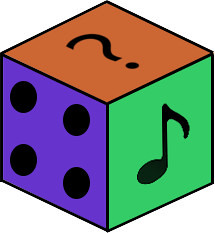
- Accompanist (role)
- Ad libitum
- Agenda
- Aleatoricism
- Aspect
- Balance
- Bartle types
- BCG
- (Cognitive) flow
- Conductor (role)
- Constellation
- Constructor (role)
- Co-optionality
- Cue cards
- Dice
- Dimension
- Downbeat
- Downtime
- Elegant Game
- Emergence
- End Condition
- Event (musical event)
- Extended technique
- Facilitator
- Fighting
- Flow
- Found sound
- Gameplay flow
- Genre
- Heteronomous Music
- Horizon of intent
- Improvisation rite
- Insert game
- Inspire cards
- Instrument Preparation
- Judge (role)
- Karaoke
- King-making
- Learning curve
- Ludomusical dissonance
- Meaningful Choice
- Mechanic
- Music game
- Non-idiomatic music
- Notation Cards
- Open work
- Parameter
- Pervasive Game
- Player (role)
- Prompter (role)
- Psychographics
- Quarterbacking
- Rhythm cards
- Rhythm game
- Roles
- RPG
- Rule Cards
- Speedrun
- Stacking
- Trading
- Transition
- Upgrade
- Victory condition
- Xenochrony
- XP
- Yes, and...
Game mechanics of providing better possibilities to the player.
Aims of usage
Extending players' options during the course of the game is a standard in almost every game genre. It's used to:
- diversify — as one of the many ways of mixing things up,
- reward — players enjoy more power,
- flatten the learning curve — at first the game is simpler and player can get to know more possibilities afterward.
The above design aims can be organically embedded in the dynamics of the game, but an Upgrade mechanic is a way of providing them directly by adding just a few rules.
Upgrades are often directly connected to limiting players' possibilities. When some option is artificially blocked at the beginning of the game, allowing for it later is considered an upgrade.
Related games
Stay in Character - character cards for this game provide a good overview of many possible upgrades available for use in different types of music games.
Other game design terms:
If you think anything should be added to this subpage, please drop a hint or a link for future editors.
